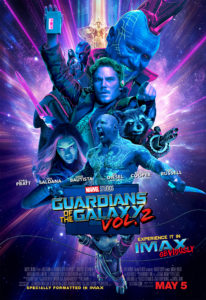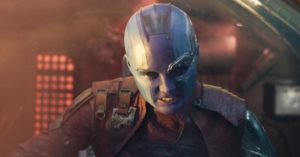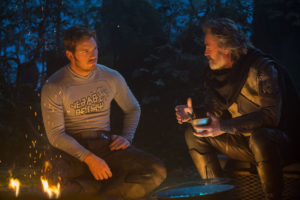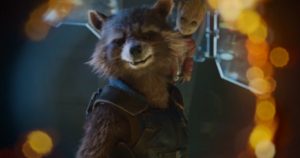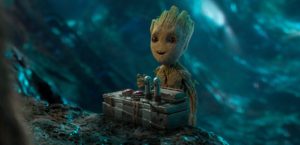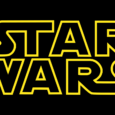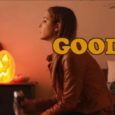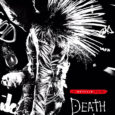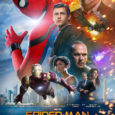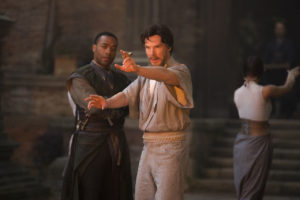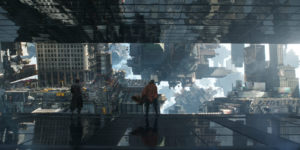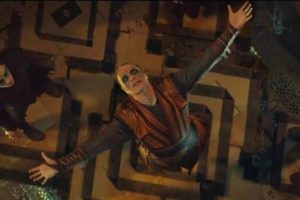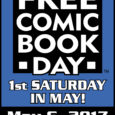Back in 2014, the world was shocked to find itself entertained by a hard sci-fi comic book movie with a main cast that featured a talking raccoon and a giant tree. Three years later, audiences eagerly anticipated the sequel to that film and here we are, talking about Guardians of the Galaxy Vol. 2. But does the second film live up to the expectations set by the first?
Guardians Vol. 2 opens on the team, composed of Star-Lord (Chris Pratt), Gamora (Zoe Saldana), Drax (Dave Bautista), Rocket (voiced by Bradley Cooper) and Groot (voiced by Vin Diesel), facing off against a pink, undulating, multi-tentacled creature at the behest of a race of beings called the Sovereign. It’s a fun scene that helps set the tone of the film and reminds audiences that they’re in for a good time.
The casting of Guardians of the Galaxy Vol. 2 is definitely one of the films’ strong points. In addition to our core line-up, we are introduced to a few new characters. The first is Ego, played masterfully by Kurt Russell. We learn that Ego is Star-Lord’s father (not a spoiler) and wants to reconnect with his son (possibly a spoiler, if you couldn’t have deduced that yourself). Russell has such a great on-screen presence that he’s a joy to watch as Ego. He exudes charm in such a way that you believe him to be Star-Lord’s father; there’s no denying these two are cut from the same cloth.
The idea of “Family” is a main theme in this movie. They touched on this a bit at the end of the first film, where the cast begin to see themselves as a makeshift family. This time, with Star-Lord meeting his father, they elevate the theme. But we also see it with Gamora and Nebula (played by Karen Gillan), a pair of sisters who were always at each others’ throats. In Vol. 2, they spend more time together and begin to understand each other better. Also, Baby Groot exemplifies the theme of “Family.” Literally a toddler, Groot has an attachment to each of the Guardians, and in turn they treat him as if they were his adoptive parent. It’s very sweet in the way it’s handled.
We also meet Mantis, Ego’s handmaiden. As a full-fledged Guardian in the Dan Abnett/Andy Lanning comic book series, it’s no surprise to learn that Mantis would eventually join the team. Played by Pom Klementieff, Mantis was fun to watch on screen. Her ability to feel the emotions of other by touching them made for a few humorous moments, and though she served a purpose to the plot, I feel like her character was introduced to provide little more than that. That said, I’m happy to see her as part of the team and look forward to seeing more of her.
One character I didn’t quite get was Sylvester Stallone’s Stakar Ogord. Introduced early in the film, Ogord was used as a foil to Yondu (Michael Rooker), and shame him for his past transgressions. Ogord doesn’t make another appearance until the very end, at which point he’s given his very own post-credits scene that points to the character doing something more meaningful. Which makes sense considering they cast goddamn Sylvester Stallone in the role. Whatever it is that writer/director James Gunn has planned for him, I can’t even fathom. To me, his inclusion in the film felt shoehorned and overblown and I could have done without it.
With the exception of Star-Lord, who learns about his heritage, we don’t get a lot of development in the main cast. Some of their backstories are expanded on but it mostly feels like a retread of what we already learned about them in the first film. Instead, the secondary cast gets to step into the spotlight, as Gunn dives into the histories of both Nebula and Yondu. We get a peek into why Nebula resents Gamora so much. Concerning Yondu, we get to delve into his relationship with Star-Lord, which was touched upon a little in the first movie but Gunn really goes in depth here. It makes for a touching story but if you spend enough time thinking about it, it becomes downright unsettling
Guardians of the Galaxy Vol. 2 is dripping with sentimentality. Mostly it’s handled well; it doesn’t get overly dramatic, like Rocket’s reaction to Groot’s “death” at the end of the first film. However, given the emotions that are boiling over, Star-Lord reconciling with his father, Star-Lord’s confrontation with Gamora about their unspoken thing, and even Drax and his reminiscing about his wife and daughter, we see how despite all of their flaws, the Guardians remain human (a term used loosely given that 80% of them are aliens).
The first Guardians was impressively funny, probably the most humor-filled film in the Marvel Cinematic Universe. Rightfully, Vol. 2 manages to keep that vibe going, and they even upped the humor quotient this go around. I’m not trying to say they squeezed more jokes into the script, which, to be fair, they seem to have done. The tone of the humor was intensified, almost to the point of being cartoonish. A scene in which Yondu, Kraglin (played by the director’s brother, Sean Gunn), and Rocket make a jump to hyperspace really displays the ways James Gunn was willing to push the envelope. It works within the confines of this film, one which is willing to play around with the laws of physics, but it just seemed over the top and unnecessary. I think we’re willing to give Gunn the leeway to do things like this because his track record is relatively clean, but I hope he doesn’t press his luck too much.
One of the ways Gunn improved in the sequel is in the pacing. The first Guardians needed to build its world so some of the scenes felt longer than they should have, mostly because of the wordy exposition used to get the point across. Vol. 2, however, has pretty much established its rules, so the only wordiness is to expand character arcs. There were still quite a few wordy monologues but at least they didn’t feel as expository.
In regards to the composition of Vol. 2, Gunn uses the same formula as he did in the first one, which is the only main downside. We open with a scene from the past, cut to quirky musical intro credits, move into character intros, exposition, exposition, dramatic turn, final battle. There’s nothing wrong with working from the formula (that is, after all, how it became a “formula”), and at least Gunn manages to make this film feel different from its predecessor. If this becomes the norm, however, it could really bring down the series.
As part of the most offbeat series in the Marvel Cinematic Universe, Guardians of the Galaxy Vol. 2 could have gone in a number of directions but I’m pleased with where James Gunn chose to take it. Humanizing the cast was a great way to keep audiences connected with the characters. It was also great to see a few of the more underutilized characters from the first film get the chance to shine (while Baby Groot is the clear fan-favorite, Drax had a few pretty amazing moments). All in all, Guardians of the Galaxy Vol. 2 never lost sight of what everyone loved about its predecessor. While not perfect, it’s a fun movie that helps to elevate Marvel’s record in regard to sequels. I’m ready for the third one.
Grade: A-
The first trailer guarantees that Doctor Strange will be visually and cinematically unlike any other Marvel movie. You sense that Marvel Studios‘ latest will give basically Inception on steroids. While Strange‘s unique architecture was never in doubt, “will it have the typical Marvel charm?” was the question on everyone’s lips. Fortunately, likely thanks to renowned comedy writer Dan Harmon‘s rewrites, the most recent Marvel Cinematic Universe entry delivers in almost every regard.
We’ll definitely arrive at why I said “almost,” but first, many movie-only fans likely need some background. Doctor Strange follows the appropriately-named Dr. Steven Strange, a very stubborn, hot-shot neurosurgeon. He’s not a very likable or charming individual; traits that leading man Benedict Cumberbatch has fun with on-screen. However, as with most every origin story, his fortunes don’t last after a devastating car accident badly damages his skilled hands.
Desperate to reattain his status for his damaged ego’s sake, he treks out to a temple in Nepal to learn the mystical arts. As expected, the pompous Strange laughs off the very idea of “magic,” but the Ancient One quickly resolves his skepticism, otherwise, there wouldn’t be much of a movie. As Strange hones his otherworldly skills, he discovers the massive responsibility his newfound friends carry on their shoulders. This leads Strange to an intriguing moral dilemma of choosing to fight for others or only himself.
As with all reviews, I aim to remain spoiler-free. Unfortunately, many things I adore from Doctor Strange involve spoilers, but I’ll tread carefully. Firstly, director Scott Derrickson and the writers utilize the cast to perfection. Cumberbatch carries the film effortlessly, but you also have supporting players turning in memorable performances. Understandable controversies aside, Tilda Swinton brings an elegance, mystique, and toughness as the Ancient One. Chiwetel Ejiofor surprises as Karl Mordo with a few impassioned speeches. Benedict Wong shines as the hilariously stone-faced (and coincidentally-named) Wong. Although not exploited to her full potential, Rachel McAdams as Christine Palmer is a fantastic addition as well.
To accompany the acting gravitas, Derrickson constructs the most impressive, innovative visuals from any Marvel title on any medium. The thrilling opening sequence whets the appetite, and the movie efficiently builds upon that. We’re shown a psychedelic sequence that could be this generation’s 2001: A Space Odyssey stargate scene. As seen in the trailers, there’s also a mind-bending foot chase where buildings and roads are upside down or sideways or inside each other. With the mystical rules having been thoroughly explained throughout the film, these set pieces are immensely gratifying.
As for these aforementioned “rules” of Doctor Strange‘s universe, I truly appreciated how fresh Marvel’s introduction to magic felt. You’ll see lived-in dimensions, ancient artifacts with a rich history, and an expansive library. There may be times where the audience will want to ask the movie to “slow down.” The filmmaker throws a potential overload of information at you. However, hearing the Ancient One’s musings such as “not everything makes sense; not everything has to,” the film successfully reminds you to turn off your brain, forget about the science behind the magic, and enjoy the ride.
Now I disclose why I earlier claimed Doctor Strange to “almost” deliver in every regard. Unfortunately, the Marvel villain conundrum continues. Mads Mikkelsen plays Kaecilius, and turns in a portrayal that’s nothing or less than “fine.” The most frustrating part is his lack of clear motivations. He monologues to Strange about his devious intentions (which don’t really seem that devious), but the “why” is entirely avoided. There are effective efforts to tease future villains that do have more depth, but it’s at the sacrifice of the current villain’s arc.
Also, I’ve spotted a few articles mentioning how Marvel movies not named The Avengers have forgettable musical scores. After hearing the Michael Giacchino presided over the musical arrangement, I was ready to lay those sentiments to rest. I gained confidence after listening to the end credits music released a few weeks ago. Yet throughout the film, I didn’t even notice the music as anything more than ambient noise. Yes, you don’t want the melodies to distract from the motion picture, but the musician in me clamored for something of literal and figurative note.
Luckily, none of these criticisms ruined how tremendous Doctor Strange was as a whole. I’ll never forget feeling that ultimate high after leaving the theater, having seen Marvel’s most inventive, creative entry yet. There are enough Easter eggs and name-drops peppered throughout to justify revisiting the movie often. As a bonus, this movie’s mid and end credits scenes possess heavy implications to Marvel’s future titles too. Most importantly, Strange has the familiar well-timed humor and joyous fun you’re looking for. The Doctor is in.
Grade: B+


